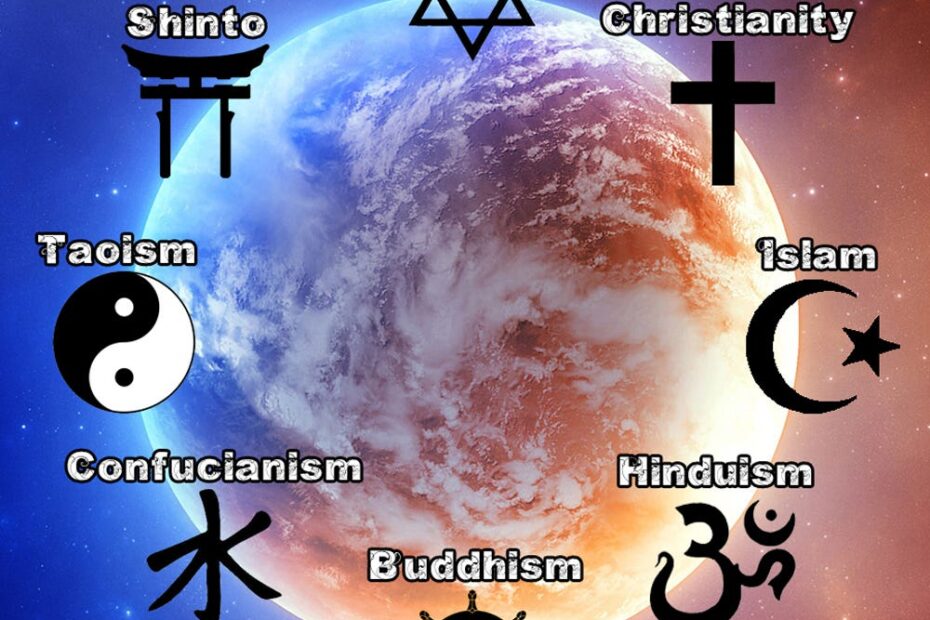“God has no religion.”
Mahatma Gandhi
Each of us connects with the word “religion” very specific ideas. The word religion (“respect for what is sacred, reverence for the gods,” “obligation, the bond between man and the gods”) is mentioned as a description of the religious life for the first time in Cicero’s “De natura deorum”. Some modern scholars favor the derivation from ligare “bind, connect”.
There are two world traditions, which have formed the cultural and ethical basis of the world, as we know it. And both have an unbroken history going back thousands of years.
1) Abrahamic religions are the monotheistic faiths of Middle East origin, recognizing a spiritual tradition identified with Abraham, the founding father of the Israelites.
Judaism is the oldest Abrahamic religion, originating in the people of ancient Israel and Judea.
Christianity is based on the life and teachings of Jesus of Nazareth. The Christian faith is essentially faith in Jesus as the Christ, the Son of God and as Savior and Lord.
Islam is based on the Quran, one of the holy books, considered by Muslims to be revealed by God, and on the teachings of the Islamic prophet Muhammad.
2) The Vedic tradition, also termed Dharmic tradition, are a family of religions that have originated from the Indian subcontinent. They encompass Hinduism and three other religions that have spawned from it—namely Buddhism, Jainism, an Sikhism.
Hinduism includes Shaivism, Vaishnavism and Shrauta among numerous other traditions. Hinduism includes a wide spectrum of laws and prescriptions of “daily morality” based on karma, dharma and societal norms.
Buddhism was founded by Siddhattha Gotama who aimed to help sentient beings to end their suffering by understanding the true nature of phenomena, thereby escaping the cycle of suffering and rebirth that is, achieving Nirvana.
Jainism is an ancient Indian religion that prescribes a path of non-violence for all forms of living beings in this world.
Sikhism is a monotheistic religion founded on the teachings of Guru Nanak and ten successive Sikh. Sikhs are expected to embody the qualities of a Sant-Sipāhī—a saint-soldier, have control over one’s internal vices and be able to be constantly immersed in virtues clarified in the Gutu Granth Sahib.
There are other religions that can’t be put into one of these two world traditions, among them Shinto (the indigenous spirituality of Japan), Zaroastrianism (an ancient Iranian religion and philosophy), Taoism (a religious tradition that emphasizes living in harmony with the Tao meaning “way”, “path” or “principle”), Confucianism (an ethical and philosophical system developed from the teachings of the Chinese philosopher Confucius) and Baha’i Faith (a monotheistic religion emphasizing the spiritual unity of all humankind).
The development of religion has taken different forms in different cultures. But we have to remember that the great teachers never founded a religion. It is the followers that established and promoted the different churches, replete with their own beliefs, dogmas, rules, rites, rituals and other governing persuasions.
Each great teacher emphasized different ideals and virtues. The ideal is the selfless aspiration to help uplift humanity and a virtue is the fulfillment of the ideal. In other words, an ideal is a virtue we promise to practice. In the end there is a basic unity of the world’s religion even if they emphasize different ideals because any particular ideal includes all the others for its altruistic completion.
| RELIGION | TEXT | IDEAL TEACHING | TEACHER | TIME |
| Hinduism | Vedas | Divine Duty, Wisdom | Vyasa and Unknown | +2000 – 600 B.C. |
| Judaism | Torah | Righteousness | Moses | ca. 1250 B.C. |
| Shinto | Kojiki & Nihonji | Godliness | Unknown | 660 B.C. |
| Zoroastrianism | Zend Avesta | Purity, Truth | Zoroaster/Zarathushtra | 660 – 583 B.C. |
| Jainism | Siddhantha Angas | Harmlessness | Mahavira Vardhamana Jnatriputra | 599-527 B.C. |
| Buddhism | Tipitakas | Compassion | Siddharta Gautama Sakyamuni Buddha | 580 – 483 B.C. |
| Taoism | Tao Teh Ching | Simplicity | Lao Tzu | 570 – 517 B.C. |
| Confucianism | The 4 Books & The 5 Classics | Altruism, Propriety | Confucius | 551 – 479 B.C. |
| Christianity | Holy Bible | Love, Forgiveness | Jesus | 105 B.C. |
| Islam | Koran | Divine Surrender | Abulqasim Mohammed | ca. 570 – 632 A.D. |
| Sikhism | Adi Granth | Devotion | Guru Nanak | 1469 – 1538 |
| Baha’i Faith | Kitab-I-Agdas | Peace | Mirza Husain Ali Nuri | 1817 – 1892 |
Sources for this article:
Escudero, B. (1994). Basic Unity of the World Religions. Summar Sophia Series, Volume 4, Number 9
Jewish Virtual Library. Abraham. (n.d.) Retrieved from basic unity of the world’s religion
Renkewitz H. (1980). Religion aus Das Moderne Bildungsbuch.
